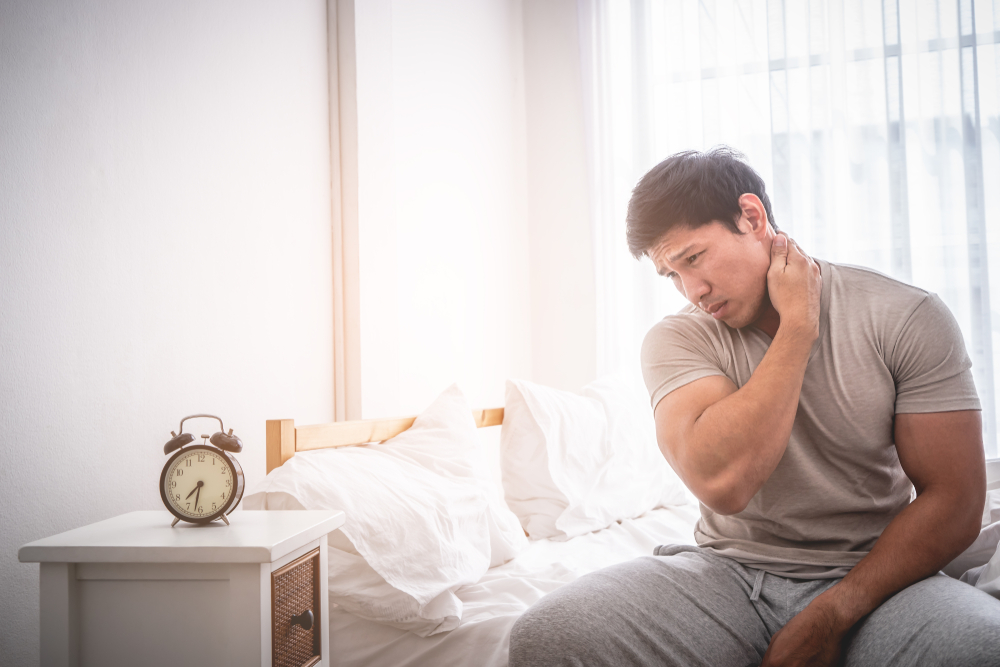Find Relief: Overcoming Chronic Pain and Sleep Apnea
Are you among the countless individuals grappling with the relentless grip of chronic pain, compounded by the disruptive effects of sleep apnea? If so, you’re not alone in your struggle.
At Sac Sleep & Breathing, our esteemed Sacramento, CA, sleep dentist, Dr. Scott Grivas, understands the intricate interplay between sleep disorders like sleep apnea and chronic pain, two debilitating conditions, and he’s dedicated to providing comprehensive solutions to help you reclaim your life. Embark on your journey to wellness by calling (916) 735-4060 and scheduling a consultation at our Northern California sleep practice.

The Vicious Cycle: Sleep Apnea and Chronic Pain
What is Sleep Apnea?
Sleep apnea is a chronic sleep disorder characterized by repeated episodes of disrupted breathing during slumber. These breathing pauses, ranging from seconds to over a minute, can occur multiple times throughout the night. Central sleep apnea (CSA) and obstructive sleep apnea (OSA) are the most prevalent forms, each with distinct underlying causes and treatment implications.
Distinguishing between these types of sleep apnea is crucial for diagnosis and effective management. Individuals with sleep apnea often experience fragmented sleep, leading to excessive daytime sleepiness, impaired cognitive function, and an increased risk of various health complications.
What is Chronic Pain?
Chronic pain is defined as persistent or recurring pain that lingers beyond the expected healing time for an injury or illness. This type of pain can stem from various underlying conditions, such as arthritis, fibromyalgia, neuropathy, or past injuries.
In contrast to acute pain, which serves as a warning signal, chronic pain often lacks a clear purpose and can profoundly impact your quality of life. Chronic pain patients frequently undergo chronic opioid therapy, a treatment that can influence their sleep quality and potentially contribute to sleep disorders.


Pain and Sleep Disturbances: The Intertwined Struggle
The relationship between sleep-disordered breathing and chronic pain is complex and bidirectional. Sleep-disordered breathing problems like sleep apnea can contribute to the development and exacerbation of chronic pain, while chronic pain can also disrupt sleep patterns and worsen sleep apnea symptoms. Pain and sleep disturbances are closely interconnected, with over 70 percent of patients with chronic pain disorders experiencing significant sleep disruptions, such as sleep apnea.

How Sleep Apnea Fuels Chronic Pain
Sleep apnea can lead to chronic pain through various mechanisms, including:
- Inflammation: Repeated oxygen deprivation and stress on the body caused by sleep-disordered breathing can trigger inflammatory processes, contributing to pain sensitivity.
- Altered Pain Perception: Sleep fragmentation and poor sleep quality associated with sleep apnea can lower pain thresholds and increase pain perception.
- Hormonal Imbalances: Sleep disorders such as obstructive sleep apnea and other apneas can disrupt the production and regulation of hormones, such as cortisol and growth hormone, which play a role in pain modulation.

How Chronic Pain Exacerbates Sleep Apnea
On the other hand, chronic pain can also exacerbate symptoms of sleep apnea by:
- Disrupting Sleep: Pain can make it difficult to fall asleep or stay asleep, leading to sleep fragmentation and increased sleep apnea episodes.
- Contributing to Weight Gain: Chronic pain can limit physical activity and contribute to weight gain, a known risk factor for sleep apnea.
- Increasing Stress and Anxiety: The emotional and mental strain of living with chronic pain can heighten stress and anxiety levels, which can worsen sleep apnea symptoms.
The Benefits of Treating Sleep Apnea for Chronic Pain Relief
Restful Slumber and Renewed Energy
Treating sleep apnea helps reduce breathing interruptions during sleep, allowing for deeper and more refreshing rest. This can significantly reduce the fatigue and excessive daytime sleepiness often experienced by those with chronic pain, helping you wake up feeling energized and revitalized.
Reduced Inflammation and Pain Sensitivity
Sleep apnea is linked to increased inflammation in the body, which can exacerbate chronic pain conditions. By effectively managing sleep apnea, inflammation levels may decrease. This can lead to a reduction in pain sensitivity and discomfort, as well as a notable improvement in pain intensity for those suffering from obstructive sleep apnea (OSA).
Enhanced Pain Management
Addressing sleep apnea can complement your existing pain management strategies, providing more consistent and substantial relief. With improved sleep quality and lower inflammation, you may find that your pain medication or therapies are more effective in reducing chronic pain symptoms.
Renewed Vitality and Well-being
When you sleep better and have less pain, you’re likely to experience higher energy levels throughout the day. This boost in vitality can lead to a greater sense of well-being, allowing you to better engage in daily activities and enjoy a better quality of life.
Mitigating Associated Health Risks
Sleep apnea is associated with various health complications, such as heart problems, diabetes, and high blood pressure, which can worsen chronic pain conditions. By treating sleep apnea, you can reduce your risk of developing or worsening these related health issues.
Cognitive Clarity and Productivity
Adequate sleep is essential for optimal cognitive abilities, including memory, decision-making, and problem-solving. By addressing sleep apnea, you may experience improved cognitive function and enhanced productivity.
Emotional Resilience and Mood Stability
Sleep plays a crucial role in regulating mood and emotional well-being. Chronic sleep disturbances, like those caused by sleep-disordered breathing, can contribute to irritability, mood swings, and emotional instability, intensifying the effects of chronic pain. By improving sleep quality, you’re likely to experience enhanced mood stability and emotional resilience, so you can better cope with the challenges associated with chronic pain.

Strategies for Managing Chronic Pain and Sleep Apnea
Managing sleep-disordered breathing problems like sleep apnea and chronic pain simultaneously can be a challenge, but there are several strategies you can adopt to keep both conditions in check:
- Adhere to your prescribed sleep apnea treatment (e.g., CPAP, oral appliances).
- Consult with a sleep medicine specialist like Dr. Grivas to explore comprehensive treatment options, including CPAP therapy and other interventions that manage sleep-disordered breathing, especially in patients suffering chronic pain or those on chronic opioid therapy.
- Incorporate gentle exercise and stretching into your routine.
- Practice relaxation techniques like deep breathing, meditation, or yoga.
- Maintain a healthy diet and weight management plan.
- Explore alternative therapies like massage, acupuncture, or cognitive-behavioral therapy.
- Stay hydrated and avoid substances that can worsen pain or sleep quality.
- Prioritize good sleep hygiene and establish a consistent sleep routine.
Financing Options: Affordable Sleep Apnea Treatment
Cash, Check, or Major Credit Cards
At Sac Sleep & Breathing, we understand that healthcare expenses can be a concern. For your convenience, we accept cash, checks, and major credit cards as payment methods for sleep apnea treatment and related services.
CareCredit
To make your treatment more affordable, we also partner with CareCredit®, a healthcare financing company that offers flexible payment plans. With CareCredit, you can spread the cost of your treatment over time, allowing you to prioritize your health without breaking the bank.
LendingClub
In addition to CareCredit, we collaborate with LendingClub, another reputable financing option. LendingClub provides personal loans for healthcare expenses, empowering you to access the treatment you need while managing your budget effectively.


Frequently Asked Questions
Can sleep apnea cause chronic pain, or does chronic pain lead to sleep apnea?
The relationship between sleep apnea and chronic pain is bidirectional, with a complex interplay in patients suffering from both conditions. Sleep-disordered breathing can contribute to chronic pain, while chronic pain can worsen sleep apnea symptoms by disrupting sleep patterns.
Are there any specific types of chronic pain that are more closely linked to sleep apnea?
While sleep apnea can contribute to various chronic pain conditions, it has been more strongly associated with fibromyalgia, headaches, and musculoskeletal pain. However, the connection between sleep-disordered breathing and chronic pain isn’t limited to these conditions and can impact those with other types of persistent pain as well.
Can lifestyle changes help manage both sleep apnea and chronic pain?
Yes, making lifestyle changes can be beneficial for managing both sleep apnea and chronic pain. A healthy diet, regular exercise routine, stress management techniques, and prioritizing sleep hygiene can help manage the two conditions.
How long does it typically take to experience improvements in chronic pain after starting sleep apnea treatment?
The timeline for experiencing improvements in chronic pain can vary from person to person. Some may notice relief within a few weeks of consistent sleep apnea treatment, while others may take longer to see significant improvements. Be patient and consistent with your treatment plan, as the benefits often accumulate over time.
Break Free from Chronic Pains and Sleep Apnea, Call Now!
If you’re among the countless patients grappling with the relentless grip of chronic pains and the disruptive effects of sleep apnea, it’s time to take action. At Sac Sleep & Breathing, our esteemed Sacramento, CA, sleep dentist, Dr. Grivas, is dedicated to providing comprehensive sleep apnea solutions to help you reclaim your life.
Call us at (916) 735-4060 to schedule an appointment and learn about your treatment options for sleep apnea. We serve new and returning patients from Sacramento and surrounding areas such as Sierra Oaks, Woodside Condo, and Campus Commons, CA.
